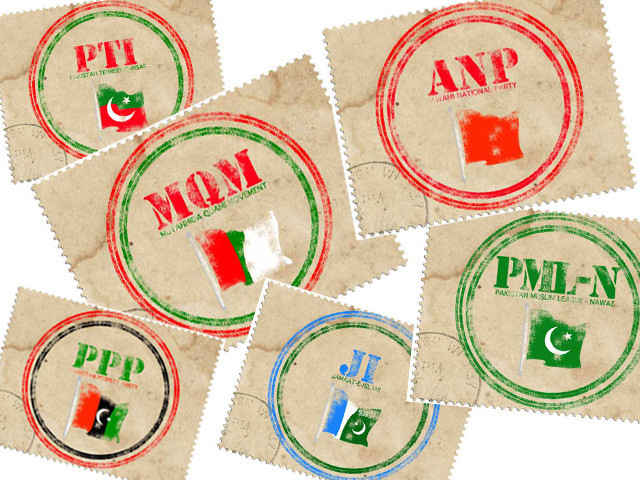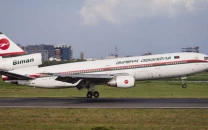Analysis: Smaller parties left out in the cold
Most small parties, have survived since they were accommodated by bigger parties.

The Sharif brothers also anxiously await the outcome of seat adjustments made with the 10-party alliance in Sindh. PHOTO: FILE
The decision of Pakistan Muslim League-Nawaz and Pakistan Tehreek-e-Insaf to contest the May 11 elections without forming any electoral alliance or entering into any major seat adjustments may result in the complete elimination of smaller political parties, which have traditionally depended heavily on support from bigger parties.
In the past, the establishment played a key role in making and breaking political alliances, usually to the Pakistan Peoples Party’s detriment. For the first time, however, the establishment has opted against using its influence on any political alliances and has not gone beyond keeping just a close eye on developments. While it may have been a result of the Asghar Khan case, the move has placed smaller parties in a dilemma.
Most small parties, which mostly revolve around certain individuals, have survived since they were accommodated by bigger parties. While it is true that some of these individuals have remained important political figures in their own right, the parties have hardly ever made a deeper mark. They’ve remained, in the words of Zulfikar Ali Bhutto, ‘tonga’ parties – driven by a single leader.
The recent setback PML-Likeminded and PML-Ziaul Haq have suffered at the hands of PML-N could be an eye-opener for many parties. Both these PML factions left Nawaz Sharif at a time when he was seeking support after the Pervez Musharraf’s October 12, 1999 coup. Now, Nawaz has returned the favour, leaving them with nowhere to turn to.
The desperation can be gauged by the fact that one prominent Likeminded leader, Kashmala Tariq, is considering leaving politics for good and taking up law practice. Other leaders may similarly be looking for new jobs. Leaders like Prof Sajid Mir and Sahibzada Fazl Karim who have been able to get elected to Parliament thanks to PML-N support, are also struggling.
The PML-N’s decision to run solo in Punjab reflects its confidence in upsetting all predictions about the close contest it may face with PTI and the PPP/PML-Quaid alliance in the province. Along with closing its door on PML-Likeminded, the PML-N has also opted against an alliance with Jamaat-e-Islami.
For JI though, it is high time it evaluated its own politics to find out as to why neither PML-N nor PTI have made any major seat arrangements with it. JI chief Syed Munawwar Hassan’s statements are rife with contradiction as well – on the one hand he blames his party’s failure to chalk out seat adjustments with other parties on foreign influence, on the other he admits JI has made adjustments on six seats with the PML-N. Not being able to strike any major seat adjustment deals with PTI, PML-N or the Jamiat Ulema-e-Islam Fazl is a failure on the part of JI’s leadership.
Meanwhile, Nawaz’s confidence in sweeping the polls in Punjab has allowed him to shift his attention to other provinces. His brother Shahbaz recently met with Sardar Akhtar Mengal, chief of Balochistan National Party-Mengal, and Mehmood Khan Achakzai, president of the Paktunkhwa Milli Awami Party (PkMAP) in Balochistan. The Sharif brothers also anxiously await the outcome of seat adjustments made with the 10-party alliance in Sindh. Reportedly, the PML-N leadership has received positive signals in Sindh.
PML-N may face problems in working out seat adjustments with JUI-F and JI in Khyber-Pakhtunkhwa, giving a slight edge to PTI. But the way politics is shaping in the province, the three parties may soon join hands against Imran Khan.
The PTI chief, at the same time, is concentrating solely on Punjab and K-P, leaving space for PML-N in Sindh and Balochistan. Imran knows that a major victory in Punjab is crucial for any hope he has of forming the government in Islamabad.
Independent candidates are unlikely to win in Punjab due to the deep polarisation in the province among three factions – PML-N, PTI and the PPP/PML-Q combine. The situation in Sindh and Balochistan may be different in this case, though. This is also an opportunity for religious and smaller parties to test their own strength through the votes they receive.
Published in The Express Tribune, April 15th, 2013.



















COMMENTS
Comments are moderated and generally will be posted if they are on-topic and not abusive.
For more information, please see our Comments FAQ